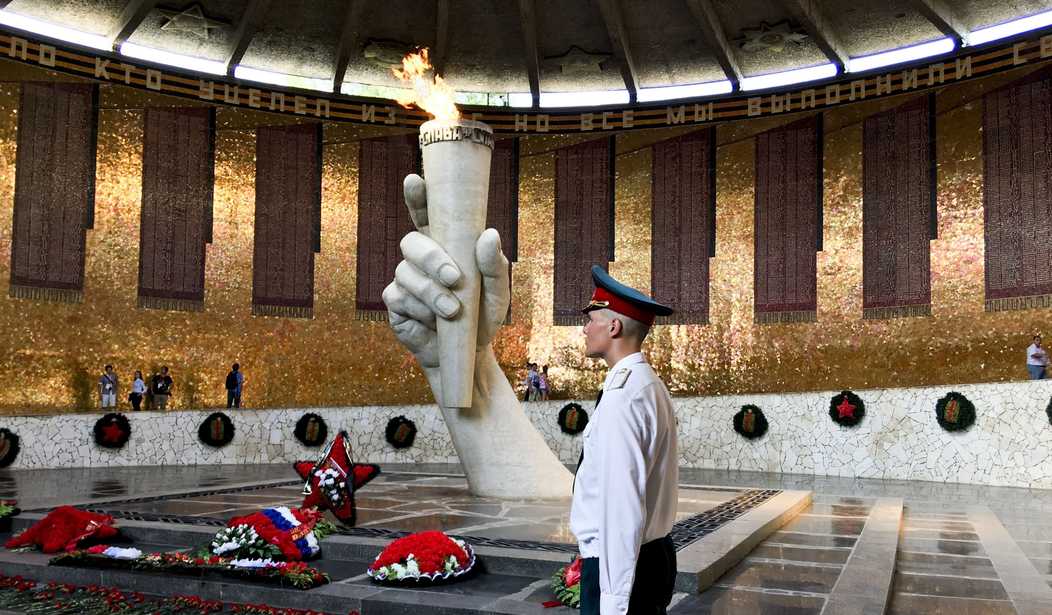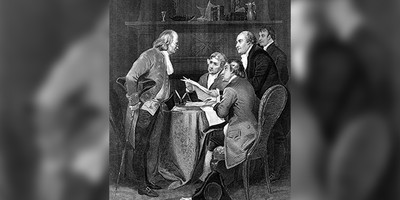Seventy-five years ago this month, the Soviet Red Army surrounded --and would soon destroy -- a huge invading German army at Stalingrad on the Volga River. Nearly 300,000 of Germany's best soldiers would never return home. The epic 1942-43 battle for the city saw the complete annihilation of the attacking German 6th Army. It marked the turning point of World War II.
Before Stalingrad, Adolf Hitler regularly boasted on German radio as his victorious forces pressed their offensives worldwide. After Stalingrad, Hitler went quiet, brooding in his various bunkers for the rest of the war.
During the horrific Battle of Stalingrad, which lasted more than five months, Russian, American and British forces also went on the offensive against the Axis powers in the Caucasus, in Morocco and Algeria, and on the island of Guadalcanal in the Pacific.
Yet just weeks before the Battle of Stalingrad began, the Allies had been near defeat. They had lost most of European Russia. Much of Western Europe was under Nazi control. Axis armies occupied large swaths of North Africa. The Japanese controlled most of the Pacific and Asia, from Manchuria to Wake Island.
Stalingrad was part of a renewed German effort in 1942 to drive southward toward the Caucasus Mountains, to capture the huge Soviet oil fields. The Germans might have pulled it off had Hitler not divided his forces and sent his best army northward to Stalingrad to cut the Volga River traffic and take Stalin's eponymous frontier city.
By the time two Red Army pincers trapped the Germans at Stalingrad in November, Russia had already suffered some 6 million combat casualties during the first 16 months of Germany's invasion. By German calculations, Russia should have already submitted, just like all of the Third Reich's prior European enemies except Britain.
Recommended
Instead, the Red Army drew the Germans deeper into the traditional quagmire of Russia until the 6th Army was low on supplies, freezing in the winter cold, and trapped more than 1,500 miles from Berlin. How did the Red Army not only survive but go on the offensive against the deadly invaders?
In part, it had no choice. Germany was intent on not just absorbing Russia, but wiping it out or enslaving millions of its citizens. In part, Britain and the United States under the Lend-Lease policy began sending huge amounts of material aid, providing everything from boots to locomotives. In part, Red Army soldiers were terrified of their own communist strongman, Josef Stalin.
Prior to the German invasion, Stalin was responsible for some 20 million Russian deaths through forced farm collectivization, planned famine, show trials and purges, and the murders of his own Red Army troops. More than 10,000 soldiers were likely executed at Stalingrad by their own officers.
But most importantly, no European invader -- neither Sweden under Charles XII in the early 1700s nor France under Napoleon in the early 1800s -- had ever successfully invaded and defeated Russia.
The country was too large, both geographically and demographically. Good weather was too brief between the spring floods and the bitter Russian winter. And Russians always fought heroically as defenders of their own soil, even if this wasn't always the case when they were fighting abroad as invaders.
Despite the horrors of Soviet Communism, the Allied winners of World War II owed a great deal to the Russian people. Russia's male and female soldiers were most responsible for destroying Hitler's vast ground forces, having killed more than two-thirds of the German soldiers lost in the war.
The Soviet Union lost about 27 million soldiers and civilians -- about 60 times more than America lost in the war.
Due to memories of the Soviet Union's Cold War ruthlessness, and because of Vladimir Putin's autocratic government, it is now fashionable to demonize Russia. Moscow sent troops into eastern Ukraine, absorbed Crimea and has sought to tamper with a U.S. presidential election.
But most Americans have forgotten key aspects of Russia's 20th-century history, a tragedy of unspeakable human losses. Outside Kiev in late summer of 1941, more than 700,000 Russian soldiers were killed or captured by Germans in a single battle.
In one of the costliest sieges in history, at Sevastopol in July 1942, 100,000 Russians were killed or captured in a failed effort to save the port on the Black Sea.
We rightly see Putin as an aggressive autocrat. But millions of Russians view Ukraine and the Crimea as sacred, blood-soaked Russian ground.
After the collapse of the nightmarish Soviet Union, Stalingrad was renamed Volgograd "city on the Volga." Today, few in the West know exactly what happened there 75 years ago this month.
This Veterans Day, we should also remember those heroic Russian soldiers. In bitter cold, and after losing hundreds of thousands of lives, they finally did the unbelievable: They halted the march of Nazi Germany.

























Join the conversation as a VIP Member